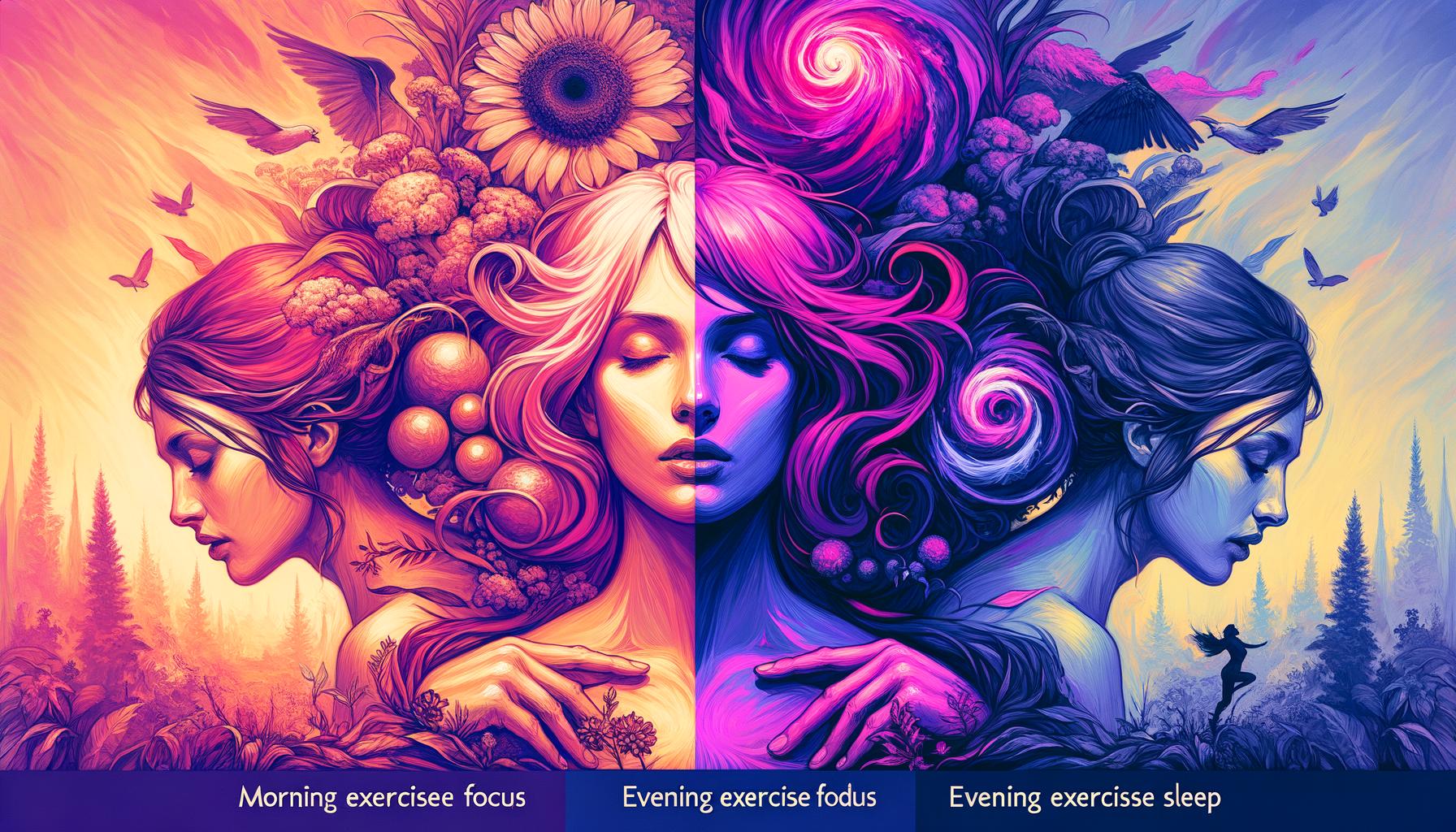· fitness · 15 min read
Optimizing Workout Times for Body and Mind
Discover how timing your workouts can improve your physical health, mental clarity, and sleep quality, and learn to align exercise with your circadian rhythm for maximum benefits.

In This Post
The Fact Why Should I Care How To Put In Action Start Tomorrow Guide How does it effect my ability to focus How does it impact my daily life How does it help me make friends How does it help me manage stress How does it effect my mood Summary: Remember Refresher Checklist The Full Research Article CitationsPrint Out The Tomorrow Checklist!
Sign up for our newsletter and receive a copy today, so that, you can start tomorrow! Or the next day, or the day after that. I forget everything and starting things is hard at least for me so these checklists are godsend.
Print Out The Remember Refresher Checklist!
Sign up for our newsletter and download your own copy of the Remember Refresher Checklist, so that, you can easily put it on your fridge and help you stay on target towards your WHY. Every little bit helps.
Introduction to Exercising and Daily Rhythms

Exercise is more than just a tool for physical health; it’s a key ingredient in the recipe for a balanced and fulfilling life. The impact of workout timing on our bodies and minds is profound, governed by the intricate dance of our biological clocks. Understanding when to engage in physical activity can elevate your well-being to new heights, making the acts of timing and consistency as critical as the exercise itself.
The Science Behind Exercise Timing
When considering the best time to exercise, it’s essential to look beyond personal preference and schedule. Science suggests that aligning workouts with your body’s natural rhythms can amplify the benefits, including enhanced performance, improved metabolic rate, and a deeper sense of mental clarity. Research points towards the existence of peak performance times, influenced by our internal clock, that can optimize the efficiency and outcome of physical activity.
Circadian Rhythm: Understanding Your Body’s Clock
Our circadian rhythm, or internal clock, orchestrates a symphony of physiological processes, including sleep-wake cycles, hormone release, and metabolic rates. This internal timing mechanism plays a critical role in determining our optimal periods of wakefulness, rest, and activity. By aligning our exercise routines with this rhythm, we can harness natural fluctuations in energy and hormone levels to maximize the effectiveness of workouts, whether they’re aimed at weight loss, muscle strength, or mental well-being.
- [ ] Identify your natural sleep-wake cycle
- [ ] Observe your energy levels throughout the day
- [ ] Experiment with morning and evening workouts
- [ ] Note differences in performance, mood, and sleep quality
- [ ] Adjust your exercise timing accordingly
This basic checklist serves as a starting point for individuals to explore and align with their circadian rhythm. By observing and adjusting, you can uncover the most beneficial timing for your workouts, leading to improved physical health, mental clarity, and overall wellness.
The Benefits of Morning Workouts

Embarking on your day with a morning workout can be incredibly beneficial, not just for your physical health but for your mental clarity and productivity as well. Let’s dive into how starting your day with exercise can transform your life for the better.
Boosting Focus and Mental Clarity
Waking up and getting straight into a workout can do wonders for your mental state throughout the day. Here are several ways morning exercises contribute to enhanced focus and mental clarity:
- Kickstarts Your Brain: Engaging in physical activity first thing in the morning increases blood flow to the brain. This provides you with the energy needed to face the day with a sharp mind.
- Releases Endorphins: Morning workouts trigger the release of endorphins, natural mood lifters, which can help reduce stress and anxiety, providing a sense of calm that enhances focus.
- Improves Decision Making: Regular morning exercise has been linked to better decision-making skills, problem-solving, and creativity, making it easier to navigate daily tasks and challenges.
Consider incorporating activities such as brisk walking, cycling, or yoga in your morning routine to maximize these mental benefits.
Enhancing Metabolic Rate and Weight Loss
If weight management is part of your fitness goals, morning workouts might be the secret ingredient you need. Here’s how exercising in the AM can boost your metabolic rate and aid in weight loss:
- Higher Calorie Burn: Exercising on an empty stomach can increase your body’s ability to burn fat. Morning workouts can take advantage of this state, potentially leading to higher calorie burn throughout the day.
- Sustained Metabolic Rate: Morning exercise can keep your metabolism elevated for hours post-workout, meaning you’re burning more calories even when not actively working out.
- Develops Consistency: People who exercise in the morning are often more consistent with their workouts since it’s completed before other responsibilities can interfere. Consistency is key when aiming for weight loss and overall physical health.
By setting your alarm a bit earlier and prioritizing your workout, you can enjoy these metabolic and weight loss benefits as part of your daily routine.
To help you get started, here’s a simple checklist for morning workout success:
- Set your workout clothes and gear out the night before.
- Have a light, energizing snack ready for a quick pre-workout boost.
- Choose workouts that you enjoy and can look forward to.
- Start with 15-20 minutes of exercise and gradually increase as you get more comfortable.
- Keep a log of your workouts to track progress and stay motivated.
Embracing morning workouts can significantly impact your fitness goals, energy levels, and mental health. It’s about creating a routine that uplifts you and fits seamlessly into your personal schedule, catering to both your physical and mental well-being. Morning exercises not only prepare you for the day ahead but also contribute to long-term health and wellness optimization. Remember, the key is consistency and listening to your body’s natural rhythms to find what works best for you.
Advantages of Evening Exercise

Improvement in Sleep Quality
Many people are on a quest to improve their sleep quality, often exploring different methods from diet changes to meditation. Interestingly, evening exercises have emerged as a potent strategy for enhancing sleep patterns. The connection between exercise and sleep quality is more significant than most think. Engaging in physical activities in the evening, especially ones that are moderate in intensity, can help in reinforcing your body’s circadian rhythm. This, in turn, signals your body that it’s time to rest.
When you exercise, your body temperature rises, and post-exercise, it gradually cools down. This cooling process can mimic the natural drop in body temperature that occurs in the evening, preparing your body for a restful slumber. Furthermore, evening workouts can also help in managing stress and anxiety, common culprits behind sleep disturbances. By incorporating physical activities in the latter part of the day, you’re not just working towards physical fitness but are also investing in better sleep quality.
Greater Muscle Strength and Flexibility
Evening exercises do not just cater to improving sleep but also play a critical role in enhancing muscle strength and flexibility. During the latter part of the day, our body is at its peak performance state. This stems from the body being fully awake, temperatures being optimal, and muscles being well-flexed and warmed up from the day’s activities. All these factors contribute to a higher capability to exert strength and perform flexibility training with reduced risks of injuries.
Training in the evening can lead to greater performance, allowing individuals to push their limits slightly further than they would during morning workouts. This not only contributes to immediate gains in strength and flexibility but, over time, can significantly impact overall physical health and fitness goals.
For those considering incorporating evening workouts into their routine, here’s a simple checklist to get started:
- Assess your current fitness level and goals.
- Choose activities that align with improving sleep quality and muscle strength.
- Create a realistic schedule that fits into your evening routine.
- Ensure your workout ends at least 1 hour before bedtime to avoid overstimulation.
- Incorporate relaxing activities post-workout, like a warm bath, to help the body unwind.
- Continuously monitor your sleep patterns and physical improvements.
Integrating exercise into your evening routine can be transformative for both your physical health and sleep quality. While it might require some adjustments to your current lifestyle, the benefits are substantial. Embracing evening workouts not only contributes to reaching fitness goals, such as weight loss, muscle strength, and endurance enhancement but also plays a crucial role in stress management and achieving a better night’s sleep. Therefore, it might be worth considering how this adjustment could fit into your personal schedule and lifestyle to optimize health and wellness.
How to Choose the Best Time for Your Workout

Choosing the best time for your workout can significantly impact your performance, energy levels, and the benefits you reap from your exercise sessions. Whether you prefer morning workouts to kickstart your day or evening exercises to unwind, the optimal time varies from person to person. Here’s how you can navigate this decision-making process:
Assessing Your Personal Schedule and Energy Levels
Understanding your daily commitments and when you feel most energized is a crucial first step in determining the best time to exercise. Here’s a simple checklist to help you evaluate:
- [ ] Identify your most and least busy times of the day.
- [ ] Note the times when you feel most alert and energized.
- [ ] Consider the duration and intensity of workouts you prefer.
- [ ] Assess how exercising at different times affects your energy and mood.
Your personal schedule plays a significant role in selecting the ideal workout time. If you’re an early bird, morning workouts might give you that mental clarity and metabolic boost. Conversely, if you find your energy peaks in the evening, that may be your prime time for greater muscle strength and flexibility training.
Understanding Your Health and Fitness Goals
Your fitness goals heavily influence the ideal time for your workouts. If weight loss and boosting your metabolic rate are your primary aims, morning exercises might serve you best. However, if you’re focusing on muscle strength or flexibility, evenings could be more beneficial, as your body’s temperature has naturally increased, potentially enhancing your performance and reducing injury risk.
Adjusting to Your Body’s Natural Rhythms
Tuning into your body’s circadian rhythm is crucial for maximizing the effectiveness of your workouts. Our biological clocks affect our physical health in several ways, including hormone levels, body temperature, and heart rate, all of which can influence exercise efficiency. Some may find that their body responds better to high-intensity workouts in the afternoon when body temperature is highest, which can lead to improved performance and decreased risk of injuries.
Incorporating your body’s natural rhythms into your workout planning can lead to optimal health and wellness optimization. It requires observation and experimentation, as the impact on sleep quality, mental clarity, and physical health varies. Listen to your body and adjust your exercise schedule as needed to find what works best for you in achieving peak performance times and maximizing exercise-induced mood boosts.
Selecting the best time for your workout is not a one-size-fits-all decision. It involves evaluating your personal schedule, fitness goals, and how your body responds at different times of the day. By being mindful of these factors and willing to adjust as you learn more about your body’s preferences and reactions, you can optimize your workouts for both your body and mind.
FAQs on Exercising Timing and Effects

When it comes to optimizing workout times for body and mind, many individuals have pressing questions. Understanding the impacts of workout timing can guide you to tailor your fitness routine in a way that aligns perfectly with your physical health and wellness goals, as well as your schedule. Here, we explore some commonly asked questions about exercise timing and its effects.
Is it Better to Exercise in the Morning or Evening?
The decision between morning workouts and evening exercises largely depends on your personal preferences, energy levels, and lifestyle. Morning workouts can kickstart your day with an exercise-induced mood boost and enhanced mental clarity, setting a positive tone for what’s ahead. They can also raise your metabolic rate and contribute to weight loss efforts.
Evening exercises, on the other hand, might fit better into your personal schedule, especially if you’re not a morning person. Evening sessions can help you unwind and improve sleep quality, particularly if stress management is a goal.
How Does Evening Exercise Affect Sleep?
Contrary to popular belief, evening exercise, when done correctly, can positively affect sleep quality. It can act as an excellent stress management tool, releasing pent-up tension and promoting relaxation before bedtime. However, it’s generally recommended to avoid very high-intensity workouts close to bedtime as they may overstimulate the body, making it harder to fall asleep.
To ensure evening workouts contribute to better sleep:
- Schedule your workout at least 1-hour before bedtime.
- Opt for moderate-intensity or calming exercises like yoga or flexibility training.
- Follow your workout with a relaxing routine to signal your body it's time to wind down.
Can the Time of Day Impact Workout Intensity?
Yes, the time of day can significantly impact workout intensity and, consequently, the effectiveness of your fitness routine. Our body’s natural rhythms, or circadian rhythm, play a role in dictating our energy highs and lows throughout the day. Generally, muscle strength and endurance are optimal in the late afternoon or early evening, making it an ideal time for more intense or demanding workouts.
However, morning exercise can also be a time for peak performance, especially once your body adjusts to a routine. Energetic morning workouts can lead to endurance enhancement and better performance over time.
In conclusion, understanding your body’s preferences, fitness goals, and energy levels will guide you in determining the best time for exercise. Whether you choose morning, afternoon, or evening, it is crucial to stay consistent and listen to your body to achieve health and wellness optimization.
Conclusion - Harnessing Timing for Optimal Health

As we wrap up our discussion on optimizing workout times for both body and mind, it’s essential to reflect on how the timing of our exercises can significantly impact our fitness journey. Choosing the ideal time for your workout can enhance your metabolic rate, improve sleep quality, and even boost your mood. Whether you’re a morning person who thrives with the sunrise or someone who finds their groove in the evening, understanding the benefits of each can help you tailor your fitness routine to meet your goals effectively.
Summarizing the Ideal Times for Various Fitness Goals
Every fitness journey is unique, and so are the goals that drive us. Here’s a quick recap of how you can harness the timing of your workouts for optimal health benefits:
- Morning Workouts: Perfect for those looking to kickstart their day with a burst of energy and mental clarity. Early exercise can also help set a positive tone for the day and is excellent for weight loss efforts due to its effects on the metabolic rate.
- Evening Exercises: Ideal for individuals aiming to improve muscle strength and flexibility. Evening sessions can also enhance sleep quality, helping you unwind and relax after a long day.
It’s crucial to align your workout times with your personal schedule, energy levels, and, most importantly, your body’s natural rhythms. Your circadian rhythm plays a significant role in determining your peak performance times. Listen to your body and adjust as needed to find what works best for you.
To help you get started, here’s a simple checklist to guide your decision:
- [ ] Identify your fitness goals (weight loss, muscle strength, flexibility, etc.)
- [ ] Pay attention to your energy levels throughout the day
- [ ] Consider your personal and work schedule
- [ ] Experiment with morning and evening workouts
- [ ] Note any changes in sleep quality
- [ ] Adjust your timing based on how your body responds
By focusing on these key areas, you can create a fitness routine that not only meets your physical health needs but also enhances your overall well-being.
Choosing the right time for exercise isn’t just about physical benefits. It’s also about making your workouts a consistent part of your lifestyle. Whether it’s the fresh, motivating atmosphere of the morning or the calming, stress-relieving aura of the evening, find your ideal time to move closer to your health and wellness optimization goals. Remember, consistency is key in paving the way toward achieving and maintaining your health and fitness aspirations.
Relevant Links - Exercising Timing

In this final section of our comprehensive journey through optimizing workout times for body and mind, we connect you to valuable resources that can further refine your understanding and application of the concepts discussed. These links serve as portals to a world of expert opinions and research-backed insights, empowering you with the knowledge to make informed decisions about your fitness regime. Here’s a shortcut to optimizing your workout timing:
Mayo Clinic Exercise and Stress: Get Moving to Manage Stress - This resource emphasizes the effects of exercise on stress and mood, highlighting how integrating physical activity into your routine can positively influence your mental and emotional well-being. It’s a testament to how morning workouts or evening exercises can serve as powerful tools for stress management and exercise-induced mood boosts.
National Sleep Foundation - How Exercise Affects Sleep - Dive into the connection between exercise and sleep quality with insights from the National Sleep Foundation. Understanding the intricate relationship between physical activity and rest can guide you to tailor your workout timings, maximizing sleep quality and ensuring your body and mind receive the restoration they need.
American Council on Exercise - The Best Time to Work Out - For those seeking expert insight on optimal workout times, this link is invaluable. Whether your goal is weight loss, improving muscle strength, or enhancing mental clarity, understanding peak performance times based on your personal schedule and circadian rhythm can lead to health and wellness optimization.
Preparing Your Path to Fitness Success
Before diving into these resources, here’s a quick checklist to ensure you’re ready to absorb and implement the wealth of information available:
- [ ] Define your primary fitness goals (e.g., weight loss, muscle strength, flexibility
training).
- [ ] Take note of your current schedule and identify potential time slots for workouts.
- [ ] Observe your energy levels at different times of the day to gauge your natural rhythms.
- [ ] Consider your sleep patterns and how they might influence or be influenced by your
workout timing.
- [ ] Keep an open mind to adjusting your routine based on expert insights and personal
experimentation.
Leveraging these resources, in conjunction with the checklist, sets the stage for a well-informed approach to fitness that respects your body’s natural rhythms, maximizes the benefits of your workouts, and ultimately leads to a healthier, happier you. By taking the time to explore these links, you’re not just planning your workouts; you’re strategically crafting a lifestyle that aligns with your physical health, mental clarity, and overall wellness goals.





